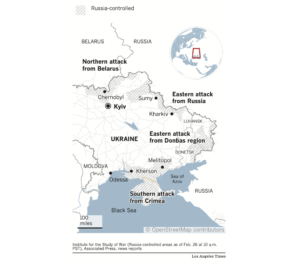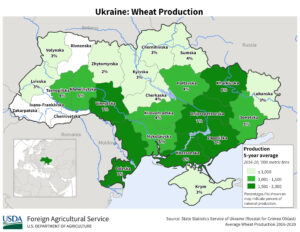President Donald Trump on Friday signed an executive order temporarily expanding the amount of beef the U.S. can import from Argentina, a move the White House says is aimed at…
War Stymies Black Sea Exports, Importers Seek Alternative Sources of Wheat, Corn- Food Inflation Worries Grow
Los Angeles Times writers Nabih Bulos, Jaweed Kaleem, and Henry Chu reported on the front page of Sunday’s paper that, “As a tense Ukraine awaited daylight early Sunday, military forces and thousands of armed volunteers fought fiercely to protect their capital against Russian troops after a day of explosions and gunfire that shook parts of the city, leaving a missile-hit high-rise tower partially destroyed and residents crowded into subway stations for shelter.”
The L.A. Times article stated that, “Some signs suggested Ukrainian fighters were succeeding beyond the expectations of Russia, which U.S. officials said has sent in the majority of the estimated 190,000 troops it had amassed near Ukraine’s borders.

“Russians ‘have been frustrated by what they have seen is a very determined resistance,’ a senior U.S. Defense Department official said on Saturday.”
Also on Sunday, Isabelle Khurshudyan, Robyn Dixon, Chico Harlan, Rachel Pannett, Annabelle Timsit and Jennifer Hassan reported at The Washington Post Online that, “Ukrainian President Volodymyr Zelensky on Sunday said that Ukraine and Russia would conduct the first diplomatic talks since the Kremlin-launched invasion, with delegations from both countries meeting at the Ukrainian border with Belarus. The two countries would meet near the Pripyat River ‘without preconditions,’ Zelensky’s office said in a Telegram message.”
The Post article added that, “But hostilities remained intense, with street fighting in Ukrainian cities and an announcement from Russian President Vladimir Putin Sunday that he had put his nuclear deterrence forces into high alert, attributing the move to ‘aggressive statements’ from the West against Russia.”
Meanwhile, Will Horner, Alistair MacDonald, and Chao Deng reported in Saturday’s Wall Street Journal that, “Russia’s incursions in the south and in the east strike at the heart of Ukraine’s most productive wheat-growing regions, which stretch across the country’s southern half, from Kharkiv on the eastern border with Russia to Odessa on the country’s Black Sea coastline.

“The fighting shouldn’t have much impact on the planting or harvesting of crops, according to Mike Lee, owner of Green Square Agro Consulting, a crop forecasting company that specializes in the Black Sea region. Wheat, for instance, is planted in September and October and harvested in July and the following months.”

“Still, if the situation on the ground escalates to a position where farmers can’t apply pesticides or fertilizers to their wheat, which will start in March, that could reduce the yield by up to a third, presuming they can harvest in July, Mr. Lee said.”
The Journal writers pointed out that, “Beijing has made Ukraine a centerpiece of its efforts to diversify grain supplies and increase food security. Chinese demand for corn is at a record high after Beijing encouraged domestic producers to pile into hog production.
Ukraine exported a record 8.2 million tons of corn to China in 2021, making up nearly 30% of total Chinese corn imports. Ukraine accounted for as much as 86% of Chinese corn imports in 2019. Ukraine also exports barley and sunflower oil to China.
Financial Times columnist John Dizard indicated on Saturday that, “Some would suggest that other grain producing areas could simply plant more to offset the loss of Black Sea exports, but that would take time and be dependent on readily available fertilisers.
“And, since Russia has prohibited the export of nitrogen fertiliser until April and China the export of phosphate fertiliser until at least June 2022, more grain output from other producing areas is even more problematic now.”
Similarly, Bloomberg writers Elizabeth Elkin and Allison Nicole Smith reported late last week that, “It’s not just the threats to grain shipments that could drive inflation. Russia is also a major low-cost exporter of nearly every kind of fertilizer. It’s hard to overstate how important fertilizer is to the food supply chain — practically every plate of food you touch has gotten there with the help fertilizers. If global trade gets disrupted, it will mean higher costs for farmers across the globe, and in turn, more food inflation.”
In separate Bloomberg News article on Friday, Elizabeth Elkin reported that, “Fertilizer prices are skyrocketing on concerns that Russia’s invasion of Ukraine will curtail global supplies.
“Prices for the popular nitrogen fertilizer urea in New Orleans surged 29% to $705 per short ton Friday, a record increase in the 45-year existence of the gauge.”

And Vivian Yee and Aida Alami reported in Saturday’s New York Times that, “Russia’s invasion of Ukraine this week threatens to further strain economies across the Middle East already burdened by the pandemic, drought and conflict. As usual, the poorest have had it the worst, reckoning with inflated food costs and scarcer jobs — a state of affairs that recalled the lead-up to 2011, when soaring bread prices helped propel anti-government protesters into the streets in what came to be known as the Arab Spring.”
Saturday’s article noted that, “In Egypt, the world’s top importer of wheat, the government was moving in the wake of the Russian invasion to find alternative grain suppliers. In Morocco, where the worst drought in three decades was pushing up food prices, the Ukraine crisis was set to exacerbate the inflation that has caused protests to break out. Tunisia was already struggling to pay for grain shipments before the conflict broke out; the war seemed likely to complicate the cash-strapped government’s efforts to avert a looming economic collapse.”

Late last week, Reuters writers Michael Hogan and Gus Trompiz reported that, “Grain exporters are looking for alternative sources of wheat and corn as a Russian invasion cuts off Ukrainian supplies, with European Union producers Romania and France being used to cover some nearby loadings, traders said on Friday.”
Nonetheless, Bloomberg writers Aine Quinn and Megan Durisin reported on Saturday that, “However, the outsized role that the Black Sea plays in global grains markets means that alternatives may be limited. Global grain stockpiles are already declining, making it more difficult to offset lost supply.”
On Sunday, Reuters writer y Dmitry Zhdannikov reported that, “Russian exports of all commodities from oil and metals to grains will be severely disrupted by fresh Western sanctions, dealing a blow to Russia’s economy and hurting the West with a spike in prices and inflation, traders and analysts said.
“The United States and its allies on Saturday moved to block certain Russian banks’ access to the SWIFT international payment system in further punishment to Moscow as it continues its military assault against Ukraine.”





